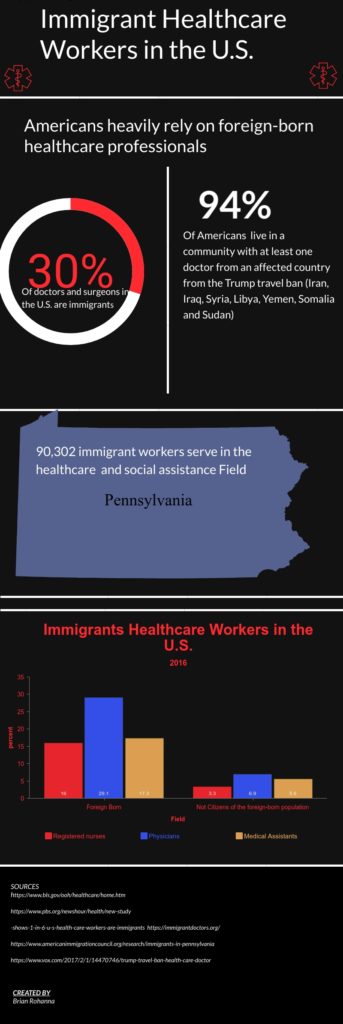Public Health Implications of Restrictionist Immigration Policies
By Brian Rohanna
Public health outcomes in adults or children can be compromised when foreign-born individuals who want to be healthcare providers find it harder to study in medical schools in the U.S.
On April 18, 2017, President Trump made an executive order to buy American and hire American. As part of this order, he altered the H-1B visa system. The H-1B visa is a temporary nonimmigrant visa category that allows employers to petition for highly educated foreign professionals. The H-1B require at least a bachelor’s degree or the equivalent. According to the U.S. Citizenship and Immigration Services (USCIS),“The H-1B visa has an annual cap of 65,000 visas each fiscal year. Additionally, there is an annual ‘master’s cap’ of 20,000 petitions filed for beneficiaries with a U.S. master’s degree or higher or doctorate from U.S. institution of higher learning.”
President Trump’s executive order stated, “In order to promote the proper functioning of the H-1B visa program, the Secretary of State, the Attorney General, the Secretary of Labor, and the Secretary of Homeland Security shall, as soon as practicable, suggest reforms to help ensure that H-1B visas.” With the New executive order that President Trump’s put into place with the H-1B visa its now much harder for foreign-born individuals to become healthcare providers in the U.S.
On July 17, 2018, CNN reported the government can now deny visa applications including H-1B visas, “without first seeking additional evidence that might be needed to complete an application, or issuing a notice stating the intent to deny a request.” These denials can pose a threat to the U.S. healthcare system, keeping qualified foreign-born medical professionals from coming to the U.S. or remaining in the U.S. According to the Immigrant Doctors Project,“Physicians in the U.S. who were born in Iran, Somalia, Sudan Syria, and Yemen provided 14 million doctors’ appointments to patients in the U.S each year.
President Trump’s temporary immigration ban could quickly undermine American healthcare, which heavily relies on foreign-born doctors. There are more than 247,000 doctors with medical degrees from foreign countries practicing in the U.S.On December 4, 2018, Reuters reported,“More than one in four doctors in the United State were born in another country, and new study suggests many nurses, dentists, pharmacists and home health aides are also immigrants.”
In today’s society, American children and adults heavily rely on health care professionals who are from foreign countries including those targeted by the executive order. Without immigrants health care professionals, American children are at risk of not getting the care they need. CBS News reported that “health care support has roughly 2.7 percent of foreign -born workers.”
Dr. Jennifer Bulcock an Assistant Professor of Philosophy and Assistant Director of the Center on Immigration at Cabrini University explains, “Given recent immigration policy we do see an decrease individual in willing or comfortable studying in the United Stat. “We have many health cares that from other countries immigrants or come on an education visa to study in the bioscience for a PhD. Bench research to look for a care in cancer”.
Dr. Bethany Welch , Executive Director of the Aquinas Center in Philadelphia, Pa., said that, in general, a just health care system for immigrants would be one that has language access, and mental health parity so that same kinds of opportunities available for physical health would exist for mental health issues, too.
Dr. Welch also feels medical care should have a cultural provision as well. “I work with a number of Muslim women, who when they’re seeing a healthcare provider, are required by their religious practice to see a women instead of a man and that’s not often honored, or if it is, it’s made such a big deal of that the woman feels uncomfortable,” she said. Dr. Welch believes medical providers could benefit from more training.
Pamela Mack-Brooks is the Coordinator of Community Health Outreach at Penn Medicine. she. saidGraduates of foreign medical schools have approximately 18 percent of biomedical research and clinical trials they run them. This loss would greatly impact many studies and opportunities for communities and patients and needs. Primary caregivers and specialists are really needed across the country, so I Feel that this would be a great loss if we had a decrease in medical professional


